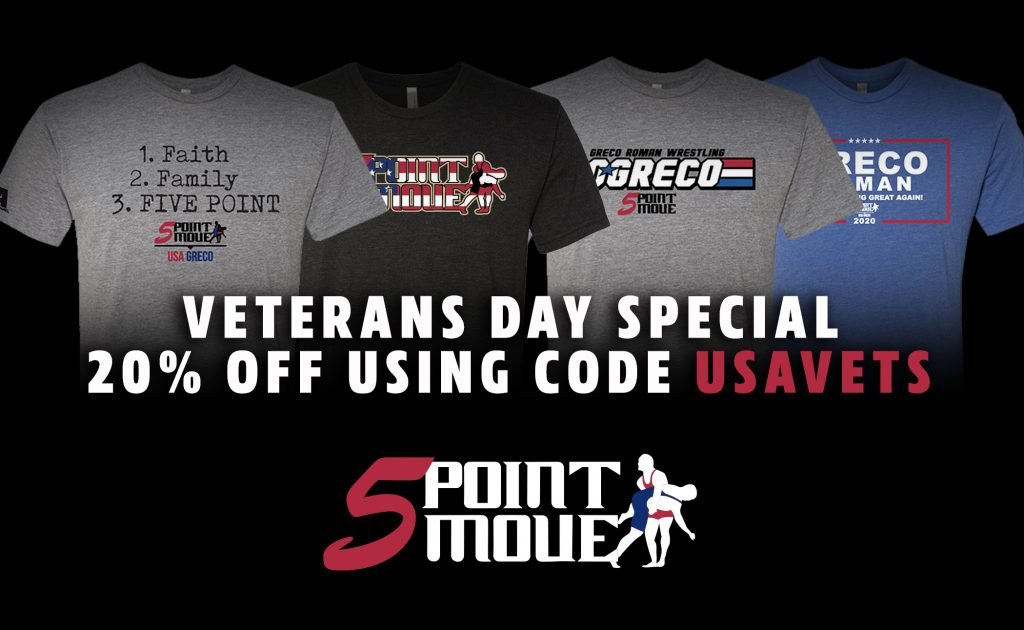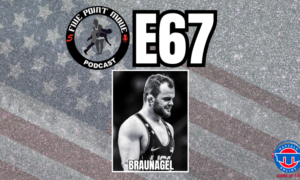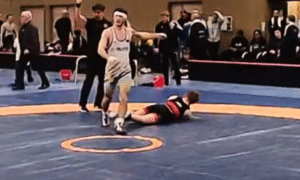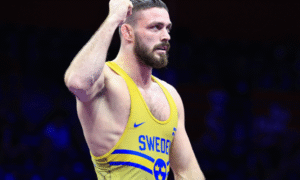Five Point Move is proud to host USA Greco-Roman National Team head coach Matt Lindland each week for Coach Lindland’s Report. Here is where you will find detailed perspectives from Coach Lindland pertaining to recent results, upcoming events, training plans, and other Greco-related news that isn’t available anywhere else. ALSO — if you would like to donate directly to the US Greco-Roman program, just click here. Your support is appreciated!
The 2019 U23 World Championships has come and gone, and the US exited the tournament with only one individual victory. For some reason, U23 is an age group that seems to flummox the American program, so that is the first order of business addressed with Coach Lindland in this report. Moving on, it is all about the Seniors. First up is the recent CISM Military World Games in China where Ildar Hafizov (60 kg, Army/WCAP) earned bronze and Ellis Coleman (67 kg, Army/WCAP, world no. 14) went 1-1.
Friday’s Bill Farrell Memorial marks the official beginning of the season for US Seniors, and following that event a high number of athletes will be taking off for Tbilisi, Georgia for a two-week training camp. Also on the docket are competitive concerns on the back-end, giving Lindland a chance to share his thoughts on the choices athletes make to compete during the beginning of what is a crucial year in their careers as well as for the program.
5PM: What needs to change, outside of perhaps more wrestlers coming in with viable international Greco experience, for the US to attain success at the U23 Worlds?
Coach Matt Lindland: Well, I think it’s pretty apparent that we need to wrestle a lot more Greco-Roman throughout the year. A lot of these athletes are still dipping into the folkstyle. Some of them even dabble a little bit in freestyle, as we saw with (David Tate) Orndorff this past year. His first match (at the U23 Worlds) was great, but then he went up against a really tough Turk (Osman Yildirim). He’s a guy (Yildirim) that if Tate was training Greco full-time, I am confident he would beat.
We were also missing a couple of guys. Cohlton Schultz wasn’t there, and the guy who won the tournament in his weight (Aliakbar Yousofiaahmadchali) was just in the finals against Cohlton two months before that at the Junior Worlds. So, not having some of our heavy-hitters at under-23 who do wrestle Greco full-time — like a Kamal Bey or a Tracy (G’Angelo) Hancock — might help us, as well.
But I think more so than that, it is time on the mat, it is experience. And we shouldn’t be getting that experience at the World Championships. When we go to these major events, these World Championships, we look at them like they’re such a big deal — which, they really are. The best guys in that age group are there competing. But the fact of the matter is that we are not competing weekend after weekend in Greco-Roman. So we treat it like it’s this really big deal to us, but for some of our competitors it’s just another tournament. They have seen these same opponents a couple of weeks ago, a month ago, or three months ago. They have opportunities to wrestle opponents multiple times in international Greco-Roman tournaments.
5PM: Do you think the time of year is a hindrance for the US, as well?
ML: Yeah, I mean, if you’re going to go with that model then the time of year does hurt the US. The entire NCAA system hurts the United States Greco-Roman program (laughs). It is the system within which we operate, and we have to figure out a way to win within that system. I think the answer is really to figure out how to get these guys more international competition.
Yeah, it is a tough time of year, but I don’t know if there is a better time. It’s kind of right after the Senior Worlds. I think it’s a good time if you weren’t an American wrestler and you weren’t embedded in this NCAA-is-the-most-important-thing-in-the-world system. I think it is a tough time of year.
5PM: We had a lot of activity recently, especially with the group in Sweden, but at the same time that was going on Ildar Hafizov won a bronze at the Military World Games, and Ellis Coleman — albeit injured — lost to Brazil (Joilson de Brito Ramos), who is seen as an obstacle for him at the Pan Am Qualifier. The event didn’t stream, but were you able to keep a close watch on those results?
ML: I was watching the results and would have loved to see Ildar. It sounded like he competed very well in this tournament. I’d like to see that film of what happened to Ellis against the Brazilian. He is someone we are going to have to worry about to qualify 67 kilos, so I want to see what happened. But he had his coaches there and I am sure they are going to help him make those adjustments and qualify the weight when it becomes time to do it.
5PM: The NYAC tournament is this Friday, which means this will be the first time, or the first time in a long while, that we will see some athletes in different weight classes. Do you think guys who were at non-Olympic weights previously are at any sort of disadvantage? Or do you sense that as the next couple of months pass, these athletes will grow comfortable enough in their weight classes to where it’s not an issue?
ML: Well, that is a tough question in the sense that I do not want to disparage anyone, for sure. Honestly, I think some guys are really in-betweeners, and there are some guys who made that move right away knowing they were going in that weight class, and they are going to figure out how they feel whether they have gone up or shrunk their bodies. But I think the guys who had some real foresight were moving around a year before the Olympics and putting themselves on World Teams and getting themselves in the right weight classes a year in advance.
I wouldn’t want to be in this situation as an athlete, especially as one of those guys who was wrestling at a World (non-Olympic) weight class. It is a tough position to be in because you know this is what you weigh, and this is where you feel comfortable and compete your best. And that is why I think it makes the most sense to make that adjustment the year before. Because, you also want to be the one to qualify that weight class yourself. Your goal is going to be to get it done at the Worlds. None of us did that this year, so we are all going to the Pan American qualifier.
But I think the smartest move was for wrestlers to make that jump ahead of time; however, I am certainly confident that a lot of guys are going to adjust well. There also may be some guys who made the wrong decision in regards to their weights and they are going to struggle. Either way, it’s going to work itself out, isn’t it?
5PM: Okay, then how about this: at least in terms of our domestic tournaments, do you think all of this movement is driving up interest and will create a lot of new, relevant match-ups combined with the fact it is an Olympic Year?
ML: I think it is driving depth to these weight classes. What Greco-Roman in the United States lacks is depth in some of our weight classes. I think it will definitely add to our depth and make these weights more challenging. It is going to force guys to compete up to their best abilities, prepare better, and train smarter. I think it is a win overall.
In a lot of other countries, they don’t even bother with the World weight classes, but I think for us, the benefit is the depth for our program and getting some guys to move into those Olympic weight classes. It is definitely going to strengthen our Team to have less weight classes and more depth.
It is certainly sad that we have gone from ten Olympic weight classes to eight, and now we’re at six. Even the 16 qualification spots have gone down from 20. It has become so hard (laughs). As if international Greco-Roman wrestling wasn’t hard enough, the difficulty in getting to the Olympic Games is real now. Getting there and performing well enough to get on the podium is as challenging as ever — and now with less qualification spots and less weight classes, it didn’t get any easier. At all.
5PM: With the Tbilisi camp coming up, are there any specific directives or goals either you or the athletes have that you would like to see accomplished?
ML: Yes, absolutely. Our goal is to improve our par terre defense and to develop a lift from top. We’ve talked to the coaches out there and explained some of our objectives and goals, and it sounds like they are willing to accommodate us at the camp. Of course, we are going to do some feet wrestling. I think breaking it up is good. When you just have par terre, par terre, par terre practice it can get a little monotonous. We are definitely going to incorporate some confusion of, Back on your feet; now back into par terre; back on the feet; back into par terre. The goal is to really improve on our defense from the bottom. There are some really great training partners with the Georgian national team and we are taking a really big delegation, as well.
It should be a great camp. We’re really excited about this opportunity to work with the Georgian team and have them host us for this camp. I am looking forward to seeing these guys come back excited and improved from this camp. This is week ten of 13 for me on the road and I’m going to be able to spend Thanksgiving with my wife and my daughter, so I am looking very much forward to that, and I am also looking forward to the opportunity our athletes are getting with this camp. And for the ones who want to get some competition in, it coincides well timewise with the Haparanda and Haavisto cups.
5PM: Are you unanimously in favor of guys getting in a string of tournaments right now between New York, Russia, Haparanda, and Haavisto?
ML: I am absolutely not unanimously in favor of that. I think there are some guys who should probably be taking a break from competition and I have spoken to those athletes individually. But this is their careers. I can give advice and guidance, but ultimately, as an elite athlete you have to make your own decision about what feels right and what you feel like you need. Certainly, I think you want to get opinions from people who have been there and done that — and are also on your side wanting to see you succeed. And I could be wrong about some of those guys in saying, This is a great time to get training in but I don’t know if you need the competition, personally. These are just conversations, like, I’d like to hear your thoughts and why you might think otherwise. But I am not opposed to it either way, to tell you the truth.
What we do need is improvement in par terre. That is certainly the goal of this (tour) and why we communicated with the coaches in Georgia and are sending the athletes to this particular region, to work on par terre stuff. That has definitely been a theme we have been working on for the past two years, focusing on those areas. And we are still getting turned, but I think there just aren’t enough good guys on top of us. We talked about depth earlier, how having more depth in each of these weight classes is going to help this year, as well. Because when you spread the guys out over ten weight classes, you’re not getting the same training partners as you are all the time.
It is really personal to these guys what they want to do, and what they feel like they need. We are certainly having those conversations, they are having conversations with their personal coaches, and I think everyone has an opportunity to get what they feel they need most. Ultimately, I think that is how they are going to have the most success: if they are getting what they need and what they want, and take advantage of those opportunities. Really, my job is to provide those opportunities and the environment, and let them make their choices regarding these aspects of their careers.
5PM: What about this part of this season do you look forward to the most?
Coach Matt Lindland: (Laughs) I look forward to qualification. I look forward to doing the proper training, to getting the right plan together that is going to take us up to our qualification tournament in early March. And right up to the week before that, deciding who needs to wrestle in the Pan American Championships prior to the qualifier, and who might need to sit out prior to the qualifier. All of the training and planning going into what each individual needs specifically. That is what we’re talking about right now.
In November and December we are far enough away that I am really a lot more flexible in saying, Hey, do what you feel you need to do right now. But there are certain guys I definitely feel need to get more matches, while there are other guys who I think could really benefit from being in a strength program right now and not getting the matches. But instead, just working technically on some areas of deficiency that we can improve on.
So you ask me what am I looking forward to? I am looking forward to qualifying six weight classes the second week in March, and all of the training and planning that will lead up to it. It’s going to be a lot of fun. I am looking forward to our athletes being as excited as I am, and motivated to put the travel and work in. Every indicator I have received from our guys — talking to them, meeting with them one-on-one, or working out with them — there is a lot of positive momentum. Guys are excited. They are up for the challenge of what it is going to take to get those weights qualified. Once we get the weights qualified, the next thing I am going to be looking forward to is getting some medals at the Olympic Games. It is really broken down in my mind for this year — stage 1, get the weights qualified; and stage 2, get the medals at the Games. Just really breaking this down into a succinct time frame.
Follow Coach Matt Lindland on Facebook and Twitter for updates on the USA Greco-Roman Wrestling program.
Listen to “5PM29: Junior world medalists Alston Nutter and Peyton Omania” on Spreaker.
SUBSCRIBE TO THE FIVE POINT MOVE PODCAST
iTunes | Stitcher | Spreaker | Google Play Music | RSS




















